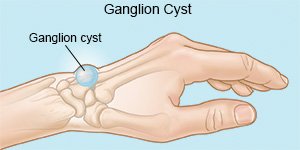Ganglion Cyst Removal
Medically reviewed by Drugs.com. Last updated on Sep 23, 2025.
WHAT YOU NEED TO KNOW:
Ganglion cyst removal is surgery to remove a small fluid-filled sac that usually occurs in the hand, wrist, foot, or ankle.
 |
HOW TO PREPARE:
The week before your surgery:
- Arrange for someone to drive you home.
- Ask your surgeon if you need to stop using aspirin or any other medicine before your surgery.
- Bring your medicine bottles or a list of your medicines when you see your surgeon. Tell your surgeon if you are allergic to any medicine. Tell your surgeon if you use any herbs, food supplements, or over-the-counter medicine.
- You may need tests such as an x-ray, ultrasound, or MRI to check the size and location of the ganglion cyst. Your surgeon will tell you when to get these tests. Contrast liquid may be used to help the cyst show up better in the pictures. Tell the healthcare provider if you had an allergic reaction to contrast liquid. Do not enter the MRI room with anything metal. Metal can cause serious injury. Tell the provider if you have any metal in or on your body.
The night before your surgery:
You may be told not to eat or drink after midnight.
The day of your surgery:
- You or a close family member will be asked to sign a legal document called a consent form. It gives healthcare providers permission to do the procedure or surgery. It also explains the problems that may happen, and your choices. Make sure all your questions are answered before you sign this form.
- An anesthesiologist will talk to you before your surgery. Tell the provider if you or anyone in your family has had a problem with anesthesia in the past. You will need anesthesia to numb the surgery area.
WHAT WILL HAPPEN:
What will happen:
- Your surgeon will make 1 or more incisions near the cyst. The surgeon will use small tools to remove the cyst. An endoscope (scope with a camera) may be used to help your surgeon see the cyst.
- Your incision may be closed with stitches, or medical glue. Your incision will be covered with a bandage.
After your surgery:
You will be taken to a room to rest until you are fully awake. Healthcare providers will monitor you closely for any problems. Do not get out of bed until your healthcare provider says it is okay.
CONTACT YOUR HEALTHCARE PROVIDER IF:
- You have a fever.
- You get a cold or the flu.
- You have questions or concerns about your surgery.
Risks
Your ganglion cyst may come back after treatment. Your scar could be painful. You may bleed too much or get an infection. You may have damage to your nerves or tendons that could lead to numbness or weakness.
Care Agreement
You have the right to help plan your care. Learn about your health condition and how it may be treated. Discuss treatment options with your healthcare providers to decide what care you want to receive. You always have the right to refuse treatment.© Copyright Merative 2025 Information is for End User's use only and may not be sold, redistributed or otherwise used for commercial purposes.
The above information is an educational aid only. It is not intended as medical advice for individual conditions or treatments. Talk to your doctor, nurse or pharmacist before following any medical regimen to see if it is safe and effective for you.
Further information
Always consult your healthcare provider to ensure the information displayed on this page applies to your personal circumstances.
